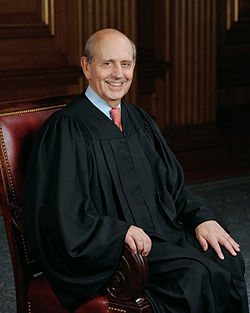Stephen Breyer
“”[S]omething I enjoy is talking to [all kinds of students]. And they'll . . . ask me . . . "What is it you find particularly meaningful about your job?" . . . [W]hat I say to them is: Look, I sit there on the bench, and after we hear lots of cases [it becomes apparent that this] is a complicated country; there are more than 330 million people. And my mother used to say, "It's every race. It's every religion." And she would emphasize this: "And it's every point of view possible." . . . [I]t's a kind of miracle when you sit there and see all of those people in front of you - people that are so different in what they think. And yet, they've decided to help solve their major differences under law. And when the students [I speak to] get too cynical, I say, "Go look at what happens in countries that don't do that."
|
| —Breyer during his retirement announcement, January 27, 2022[1] |
| It's the Law |
| To punish and protect |
Supreme Court Justice Stephen Breyer was born in 1938, in San Francisco, California.[2] He is a US Army veteran and the son of a lawyer.[3] He holds degrees from Stanford, Oxford, and Harvard Universities. He worked for the US Attorney General's Office in the 1960s and on the Watergate Special Prosecution Force in 1973. Breyer taught law at Harvard and in Sydney, Australia, and Rome, Italy. He is a Bill Clinton appointee. He replaced Harry Blackmun, author of the majority opinion in Roe v. Wade, in 1994. On January 27, 2022, he announced his intention to retire from SCOTUS in June, at the end of the Court's term. His announcement garnered more attention than usual, as Joe Biden promised that the seat would go towards appointing the first Black woman to the Supreme Court. His successor was later revealed as Ketanji Brown Jackson.
Quotes[edit]
“”Through commerce, through globalization, through the spread of democratic institutions, through immigration to America, it's becoming more and more one world of many different kinds of people. And how they're going to live together across the world will be the challenge, and whether our Constitution and how it fits into the governing documents of other nations, I think will be a challenge for the next generation.
|
| —[4] |
External links[edit]
- Breyer dissent in Bush v. Gore
- Breyer dissent in wiretapping case
- Breyer dissent in legislative prayer case
References[edit]
- ↑ Remarks by President Biden on the Retirement of Supreme Court Justice Stephen Breyer, White House Briefing Room - Speeches and Remarks
- ↑ Current Members
- ↑ Stephen Breyer
- ↑ Living Constitution
